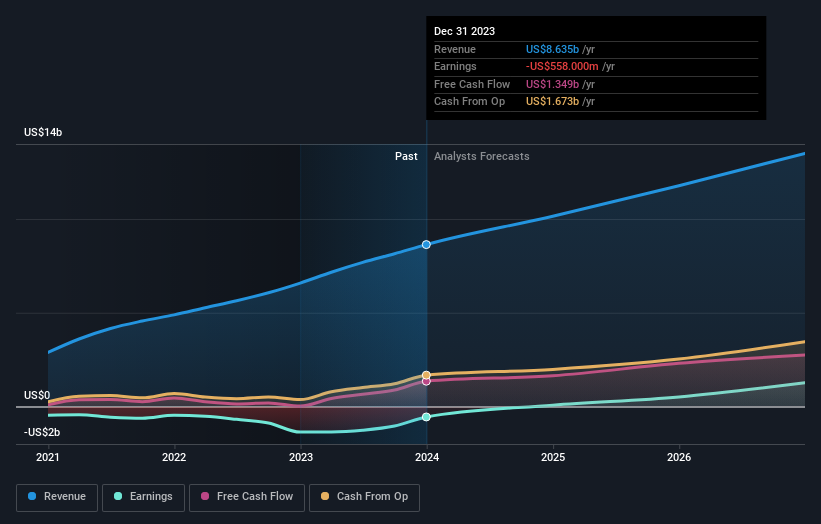US$125 - That's What Analysts Think DoorDash, Inc. (NASDAQ:DASH) Is Worth After These Results
Shareholders might have noticed that DoorDash, Inc. (NASDAQ:DASH) filed its full-year result this time last week. The early response was not positive, with shares down 3.8% to US$121 in the past week. It was a pretty bad result overall; while revenues were in line with expectations at US$8.6b, statutory losses exploded to US$1.42 per share. The analysts typically update their forecasts at each earnings report, and we can judge from their estimates whether their view of the company has changed or if there are any new concerns to be aware of. We've gathered the most recent statutory forecasts to see whether the analysts have changed their earnings models, following these results.
See our latest analysis for DoorDash
Taking into account the latest results, the consensus forecast from DoorDash's 33 analysts is for revenues of US$10.1b in 2024. This reflects a notable 17% improvement in revenue compared to the last 12 months. DoorDash is also expected to turn profitable, with statutory earnings of US$0.15 per share. Yet prior to the latest earnings, the analysts had been forecasting revenues of US$10.1b and losses of US$0.17 per share in 2024. Although we saw no serious change to the revenue outlook, the analysts have definitely increased their earnings estimates, estimating a profit next year, compared to previous forecasts of a loss. So it seems like the consensus has become substantially more bullish on DoorDash.
The consensus price target rose 11% to US$125, suggesting that higher earnings estimates flow through to the stock's valuation as well. That's not the only conclusion we can draw from this data however, as some investors also like to consider the spread in estimates when evaluating analyst price targets. Currently, the most bullish analyst values DoorDash at US$155 per share, while the most bearish prices it at US$53.00. This is a fairly broad spread of estimates, suggesting that analysts are forecasting a wide range of possible outcomes for the business.
Another way we can view these estimates is in the context of the bigger picture, such as how the forecasts stack up against past performance, and whether forecasts are more or less bullish relative to other companies in the industry. It's pretty clear that there is an expectation that DoorDash's revenue growth will slow down substantially, with revenues to the end of 2024 expected to display 17% growth on an annualised basis. This is compared to a historical growth rate of 41% over the past five years. By way of comparison, the other companies in this industry with analyst coverage are forecast to grow their revenue at 9.7% annually. So it's pretty clear that, while DoorDash's revenue growth is expected to slow, it's still expected to grow faster than the industry itself.
The Bottom Line
The most important thing to take away is that there's been a clear step-change in belief around the business' prospects, with the analysts now expecting DoorDash to become profitable next year. Fortunately, they also reconfirmed their revenue numbers, suggesting that it's tracking in line with expectations. Additionally, our data suggests that revenue is expected to grow faster than the wider industry. There was also a nice increase in the price target, with the analysts clearly feeling that the intrinsic value of the business is improving.
With that in mind, we wouldn't be too quick to come to a conclusion on DoorDash. Long-term earnings power is much more important than next year's profits. At Simply Wall St, we have a full range of analyst estimates for DoorDash going out to 2026, and you can see them free on our platform here..
Even so, be aware that DoorDash is showing 1 warning sign in our investment analysis , you should know about...
Have feedback on this article? Concerned about the content? Get in touch with us directly. Alternatively, email editorial-team (at) simplywallst.com.
This article by Simply Wall St is general in nature. We provide commentary based on historical data and analyst forecasts only using an unbiased methodology and our articles are not intended to be financial advice. It does not constitute a recommendation to buy or sell any stock, and does not take account of your objectives, or your financial situation. We aim to bring you long-term focused analysis driven by fundamental data. Note that our analysis may not factor in the latest price-sensitive company announcements or qualitative material. Simply Wall St has no position in any stocks mentioned.

